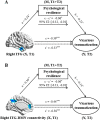Psychological resilience mediates the protective role of default-mode network functional connectivity against COVID-19 vicarious traumatization
- PMID: 37380702
- PMCID: PMC10307857
- DOI: 10.1038/s41398-023-02525-z
Psychological resilience mediates the protective role of default-mode network functional connectivity against COVID-19 vicarious traumatization
Abstract
Vicarious traumatization (VT), a negative reaction to witnessing others' trauma, has been experienced by some people during the COVID-19 pandemic, and can lead to mental health problems. This study aimed to identify functional brain markers of COVID-specific VT and explore the psychological mechanism underlying the brain-VT link. One hundred healthy participants underwent resting-state functional magnetic resonance imaging before the pandemic (October 2019-January 2020) and completed VT measurement during the pandemic (February-April 2020). Whole-brain correlation analysis based on global functional connectivity density (FCD) mapping revealed that VT was negatively correlated with FCD in the right inferior temporal gyrus (ITG) (i.e., the lower FCD in ITG, the worse the VT), identified by mapping onto known large-scale networks as part of the default-mode network (DMN). Resting-state functional connectivity (RSFC) analysis using ITG as seed found that VT was predicted by lower functional connectivity between ITG and other DMN regions including left medial prefrontal cortex, left orbitofrontal cortex, right superior frontal gyrus, right inferior parietal lobule and bilateral precuneus (i.e., the lower the ITG-DMN connectivity, the worse the VT). Mediation analyses suggested that psychological resilience served as a mediator in these associations of ITG FCD and ITG-DMN RSFC with VT. Our results provide novel evidence on the brain basis of VT and emphasize psychological resilience as an important link from DMN functional connectivity to COVID-specific-VT. This may facilitate public health interventions by helping identify individuals at risk of stress- and trauma-related psychopathologies.
© 2023. The Author(s).
Conflict of interest statement
The authors declare no competing interests.
Figures



Similar articles
-
Brain structure and functional connectivity linking childhood cumulative trauma to COVID-19 vicarious traumatization.J Child Psychol Psychiatry. 2024 Nov;65(11):1407-1418. doi: 10.1111/jcpp.13989. Epub 2024 Apr 17. J Child Psychol Psychiatry. 2024. PMID: 38629717
-
COVID-19 vicarious traumatization links functional connectome to general distress.Neuroimage. 2022 Jul 15;255:119185. doi: 10.1016/j.neuroimage.2022.119185. Epub 2022 Apr 7. Neuroimage. 2022. PMID: 35398284 Free PMC article.
-
The long-term intensive gymnastic training influences functional stability and integration: A resting-state fMRI study.Psychol Sport Exerc. 2024 Sep;74:102678. doi: 10.1016/j.psychsport.2024.102678. Epub 2024 May 29. Psychol Sport Exerc. 2024. PMID: 38821251
-
Association of ovarian hormones with mapping concept of self and others in the brain's default mode network.Neuroreport. 2020 Jul 10;31(10):717-723. doi: 10.1097/WNR.0000000000001477. Neuroreport. 2020. PMID: 32453019
-
Evidence of functional abnormalities in the default mode network in bipolar depression: A coordinate-based activation likelihood estimation meta-analysis.J Affect Disord. 2023 Apr 1;326:96-104. doi: 10.1016/j.jad.2023.01.088. Epub 2023 Jan 27. J Affect Disord. 2023. PMID: 36717032 Review.
Cited by
-
Molecular mechanisms underlying the neural correlates of working memory.BMC Biol. 2024 Oct 21;22(1):238. doi: 10.1186/s12915-024-02039-0. BMC Biol. 2024. PMID: 39428484 Free PMC article.
-
Pre-COVID brain network topology prospectively predicts social anxiety alterations during the COVID-19 pandemic.Neurobiol Stress. 2023 Oct 1;27:100578. doi: 10.1016/j.ynstr.2023.100578. eCollection 2023 Nov. Neurobiol Stress. 2023. PMID: 37842018 Free PMC article.
-
Social intelligence mediates the protective role of resting-state brain activity in the social cognition network against social anxiety.Psychoradiology. 2024 Apr 24;4:kkae009. doi: 10.1093/psyrad/kkae009. eCollection 2024. Psychoradiology. 2024. PMID: 38799033 Free PMC article.
-
Sleep, brain systems, and persistent stress in early adolescents during COVID-19: Insights from the ABCD study.J Affect Disord. 2024 Feb 1;346:234-241. doi: 10.1016/j.jad.2023.10.158. Epub 2023 Nov 7. J Affect Disord. 2024. PMID: 37944709
References
-
- Gates B. Responding to Covid-19 — A Once-in-a-Century Pandemic? N Engl J Med. 2020;382:1677–9. - PubMed
Publication types
MeSH terms
LinkOut - more resources
Full Text Sources
Medical
Miscellaneous

